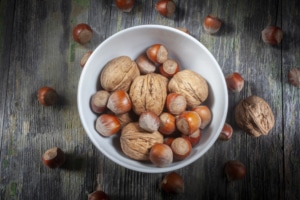When weighing cashews vs hazelnuts, you simply must factor in nutrition, culinary flexibility, and personal preference. Both fall within the nuts and seeds category of foods and provide a wide range of essential nutrition. We at Glenda’s Farmhouse suggest that you keep both on hand for whatever craving you have or recipe you find.

Features of Cashews
- Native to South America
- Buttery, sweet flavor
- Used in both sweet and savory dishes
- Nutrient-rich (healthy monounsaturated and polyunsaturated fats, protein, fiber, vitamins, and minerals)
- Flexible in uses – raw, roasted, creamed, ground
- Available for purchase whole, chopped, and ground
- Vitamin rich (Thiamine, Pyridoxine, Vitamin K, Pantothenic acid, Riboflavin, Niacin, Folate, and Vitamin E)
Features of Hazelnuts
- Native to the northern hemisphere
- Semi-sweet and semi-nutty flavor
- Used in both sweet and savory dishes
- Nutrient-rich (healthy monounsaturated and polyunsaturated fats, protein, fiber, vitamins, and minerals)
- Flexible in uses – raw, roasted, topping, ingredient
- Available for purchase whole, chopped, and ground
- Vitamin rich (Thiamine, Pyroxidie, Folate, Vitamin E, Niacin, Pantothenic acid, Vitamin K, Vitamin C, and Riboflavin)
| Cashews (1 oz.) | Hazelnuts (1 oz.) | |
| Calories | 553 | 628 |
| Carbohydrates | 30 g | 17 g |
| Sugar | 6 g | 4 g |
| Fiber | 3 g | 10 g |
| Protein | 18 g | 15 g |
| Fat | 44 g | 61 g |
| Saturated Fat | 8 g | 4.5 g |
| Vitamin A | 0 | 20IU |
| Vitamin C | 0.5 mg | 6 mg |
| Vitamin D | 0 | 0 |
| Thiamine (Vitamin B1) | 0.4 mg | 0.6 mg |
| Riboflavin (Vitamin B2) | 0.06 mg | 0.11 mg |
| Niacin (Vitamin B3) | 1.06 mg | 1.8 mg |
| Pantothenic acid (Vitamin B5) | 0.9 mg | 0.9 mg |
| Pyridoxine (Vitamin B6) | 0.4 mg | 0.6 mg |
| Folate (Vitamin B9) | 25 µg | 113 µg |
| Cobalamin (Vitamin B12) | 0 | 0 |
| Vitamin E | 0.9 mg | 15 mg |
| Vitamin K | 34.1 µg | 14.2 µg |
| Calcium | 37 mg | 114 mg |
| Copper | 2.2 mg | 1.72 mg |
| Fluoride | 0 | 0 |
| Iron | 6.7 mg | 4.7 mg |
| Magnesium | 292 mg | 163 mg |
| Manganese | 1.66 mg | 6.18 mg |
| Phosphorus | 593 mg | 290 mg |
| Potassium | 660 mg | 680 mg |
| Selenium | 19.9 µg | 2.4 µg |
| Sodium | 12 mg | 0 |
| Zinc | 5.78 mg | 2.45 mg |
Culinary Uses of Hazelnuts and Cashews
Hazelnuts
The hazelnut is an ingredient used in a wide range of dishes from baked goods to seafood, pesto, pizza, and salad, and we all love a good hazelnut spread.
Toasted, hazelnuts make an excellent topping for sweet treats like ice cream and yogurt as well as oatmeal, pancakes, and salad.
Cashews
The cashew is another ingredient that can be used in all sorts of ways. Toasted, creamed, sauced, smothered, or ground, cashews add nutrition and flavor to various dishes. There’s a reason that cashews are always the first nut gone from the mixed nut can.
Don’t choose cashews vs hazelnuts; choose both, and order your supply from Glenda’s Farmhouse for convenient home delivery.



